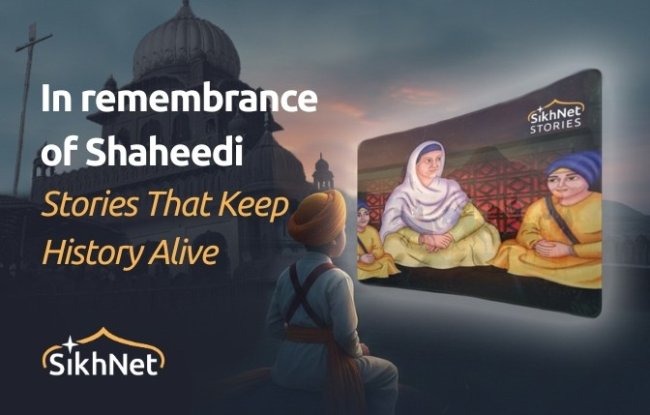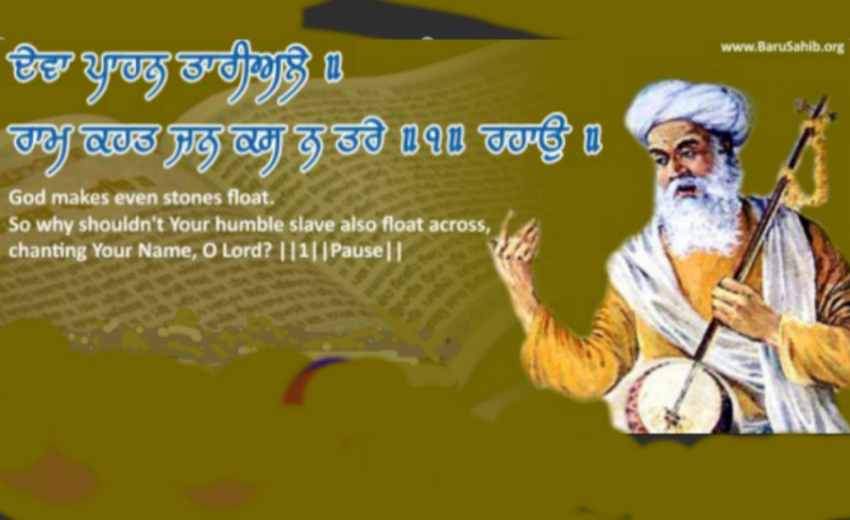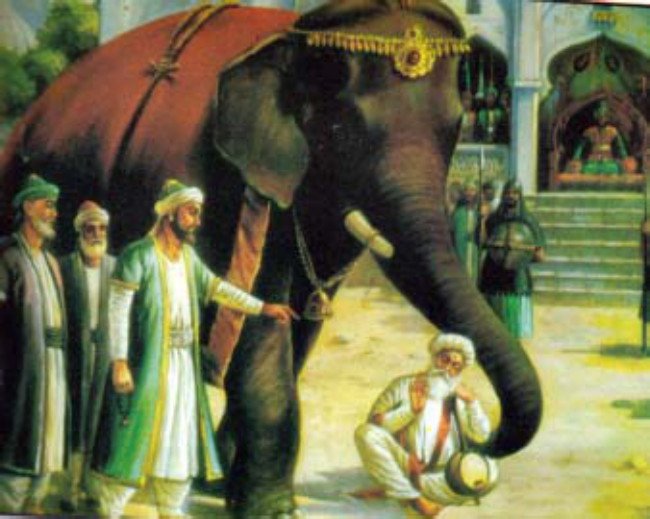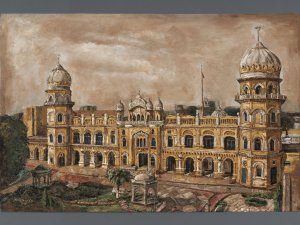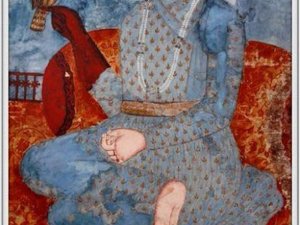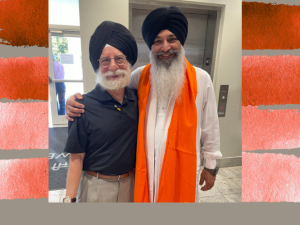Sri Guru Granth Sahib has saluted and honored fifteen saints of Bhakti movement from the medieval India, by including their compositions in it. When the Fifth Guru, Guru Arjan Dev Ji compiled Guru Granth Sahib Ji, he incorporated their compositions as an endorsement of their contributions along with alignment of their thought processes with Guru Nanak’s. So, even today when one bows to Guru Granth Sahib Ji he/she is bowing to these fifteen saints as well. As most of these Bhagats came from discriminated lower castes, Guru Ji erased that discrimination and stigma. He had elevated them, and now they don the same throne along with all the Gurus in the scripture, garnering the same reverence. The banis of Bhagat Namdev were collected by Guru Nanak Dev Ji from his place of birth during his second Udassi (Long Journey) in the south and it was passed down to Guru Arjan Dev Ji.
This year marks the 750th birth anniversary of Bhagat Namdev Ji; in his honor let us explore his life and legacy. Bhagat Namdev was born on 26th October in 1270 in the village of Narsi Bahamni in Satara district in Maharashtra. This place is quite close to Nanded, where Guru Gobind Singh Ji spent his last years and breathed his last. His ancestry begins with Yadushet, who was a tailor by caste. His father’s name Damashet and mother’s name was Gunai or Gonabai. At the age of two Namdev started repeating the name of Sri Vithal. Sri Vithal is a form of Krishna, which is worshipped in Maharashtra.
An incident took place early in his life at age of eight. One day while going out of town on some business, his father assigned Namdev the task of making the offerings at the temple of Aundha Nagnath (Nageshwaram). This is a very famous temple in the village and also considered as eighth of the twelfth jyotirlingas in India, an important place of pilgrimage. The next morning, he took milk in a bowl, which has been freshly milked and a pot of water as an offering called “Naivedya”. Namdev did realize that idols cannot partake in the offerings, but he later used the incident as a metaphor to describe his meeting with Almighty, which he captured in these words:
"ਦੂਧੁ ਕਟੋਰੈ ਗਡਵੈ ਪਾਨੀ ॥ ਕਪਲ ਗਾਇ ਨਾਮੈ ਦੁਹਿ ਆਨੀ ॥੧॥ ਦੂਧੁ ਪੀਉ ਗੋਬਿੰਦੇ ਰਾਇ ॥ ਦੂਧੁ ਪੀਉ ਮੇਰੋ ਮਨੁ ਪਤੀਆਇ ॥ ਨਾਹੀ ਤ ਘਰ ਕੋ ਬਾਪੁ ਰਿਸਾਇ ॥੧॥ ਰਹਾਉ ॥ ਸੋਇਨ ਕਟੋਰੀ ਅੰਮ੍ਰਿਤ ਭਰੀ ॥ ਲੈ ਨਾਮੈ ਹਰਿ ਆਗੈ ਧਰੀ ॥੨॥ ਏਕੁ ਭਗਤੁ ਮੇਰੇ ਹਿਰਦੇ ਬਸੈ ॥ ਨਾਮੇ ਦੇਖਿ ਨਰਾਇਨੁ ਹਸੈ ॥੩॥ ਦੂਧੁ ਪੀਆਇ ਭਗਤੁ ਘਰਿ ਗਇਆ ॥ ਨਾਮੇ ਹਰਿ ਕਾ ਦਰਸਨੁ ਭਇਆ ॥੪॥੩॥"
“Dhoodh kaTorai gaddavai paanee. Kapal gai naamai dhuh aanee. 1. Dhoodh peeau gobi(n)dhe rai. Dhoodh peeau mero man pateeaai. Naahee ta ghar ko baap risai. 1. Rahaau. Suoin kaToree a(n)mirat bharee. Lai naamai har aagai dharee. 2. Ek bhagat mere hiradhe basai. Naame dhekh narain hasai. 3. Dhoodh peeaai bhagat ghar giaa. Naame har kaa dharasan bhiaa. 4. 3.” (SGGS, Pg. No.1163)
Literal Translation: Namdev milked the brown cow, and brought a cup of milk and a pot of water as offering to God. "Please drink this milk, O my Sovereign Lord God. Drink this milk and my mind will be happy. Otherwise, my father will be angry with me." Pause. Taking the golden cup, Namdev filled it with the ambrosial milk, and placed it before the Lord. The Lord looked upon Namdev and smiled. “This one devotee abides within my heart.” The offered milk was partaken (Namdev believes it was by God), and the happy devotee returned home. Thus did Namdev come to receive the Blessed Vision of the Lord's Darshan.Metaphorical Essence: Namdev Ji offered his pure heart for which he used the metaphor of golden bowl, full of (sweet) milk of meditation to drink. His humble offering was accepted by Lord and Namdev Ji felt ecstasy, a state of poise (Sehaj in his words “Bhagat Ghar giaa”).
Namdev was married early by his parents at age eleven to Rajabai. Rajabai was daughter of Govinda Sheti Sadavarte. They had four sons and a daughter. One day, a holy man stole a merchant’s money bag and falsely implicated Namdev. The merchant had taken his clothes and bag to have the bathe in the river, only to find bag missing upon return. The merchant could not think of attributing the theft to a person in a religious garb. So, Namdev was charged with the theft. Namdev’s denials were of no avail and he was flogged at the orders of the merchant. While Namdev was being punished, suddenly a storm raged lifting the sheet on which the reputed holy man was sitting. The missing bag was found under the sheet. Namdev addressed following verse to the hypocrite by calling the spade a spade in these words:
"ਸਾਪੁ ਕੁੰਚ ਛੋਡੈ ਬਿਖੁ ਨਹੀ ਛਾਡੈ ॥ ਉਦਕ ਮਾਹਿ ਜੈਸੇ ਬਗੁ ਧਿਆਨੁ ਮਾਡੈ ॥੧॥ ਕਾਹੇ ਕਉ ਕੀਜੈ ਧਿਆਨੁ ਜਪੰਨਾ ॥ ਜਬ ਤੇ ਸੁਧੁ ਨਾਹੀ ਮਨੁ ਅਪਨਾ ॥੧॥ ਰਹਾਉ ॥"
“Saap ku(n)ch chhoddai bikh nahee chhaaddai. Audhak maeh jaise bag dhiaan maaddai. 1. Kaahe kau keejai dhiaan japa(n)naa. Jab te sudh naahee man apanaa. 1. Rahaau. ” (SGGS, Pg. No. 485)
Translation: The snake sheds its skin, but does not lose its venom. The heron appears to be meditating, but it is concentrating on the water (looking for fish). Why do you practice meditation and chanting, when your mind is not pure?
Namdev Ji found a worthy master in Visobha Khecher. Visobha Khecher explained to Namdev; “God is everywhere; but our sensory organs do not realize that.” Visobha helped Namdev in his spiritual growth. He realized that all big and small, rich and poor are God’s equal creation. He started believing Lord in everything and everywhere, giving up idol worship. His following words describe his new spiritual experience:
"ਏਕੈ ਪਾਥਰ ਕੀਜੈ ਭਾਉ ॥ ਦੂਜੈ ਪਾਥਰ ਧਰੀਐ ਪਾਉ ॥ ਜੇ ਓਹੁ ਦੇਉ ਤ ਓਹੁ ਭੀ ਦੇਵਾ ॥ ਕਹਿ ਨਾਮਦੇਉ ਹਮ ਹਰਿ ਕੀ ਸੇਵਾ ॥੪॥੧॥"
“Ekai paathar keejai bhaau. Dhoojai paathar dhareeaai paau. Joe oh dheau ta oh bhee dhevaa. Kahae naamadheau ham har kee sevaa. 4. 1.” (SGGS, Pg. No. 525)
Translation: One stone is lovingly decorated, while another stone is walked upon. If one is a god, then the other must also be a god. Says Namdev, I serve the Lord.
Namdev realized that one stone is reverently touched with the forehead while other is stepped on; such is the strange irony and contradiction. He added that my Guru has cleared these doubts, thus putting him on the path of devotion to the Lord. The following words shed light on his new understanding as:
"ਈਭੈ ਬੀਠਲੁ ਊਭੈ ਬੀਠਲੁ ਬੀਠਲ ਬਿਨੁ ਸੰਸਾਰੁ ਨਹੀ ॥ ਥਾਨ ਥਨੰਤਰਿ ਨਾਮਾ ਪ੍ਰਣਵੈ ਪੂਰਿ ਰਹਿਓ ਤੂੰ ਸਰਬ ਮਹੀ ॥੪॥੨॥"
“E'eebhay beettal uoobhay beettal beettal bin sa(n)saar nahee. Thaan thana(n)tar naamaa pranavai poor rahio too(n) sarab mahee. 4. 2.” (SGGS, Pg. No. 485)
Translation: The Lord is here, the Lord is there; without the Lord, there is no world at all. Prays Namdev, O Lord, You are totally permeating and pervading all places and interspaces.
When Namdev was about twenty, he met a great saint Jnanadev at Pandharpur. Jnanadev was also a disciple of Vishoba Khecher. Jnanadev was naturally attracted to Namdev as a great devotee of Vishoba. Jnanadev was very devastated by the death of Vishoba; he thought that traveling to places of pilgrimage will provide solace to his heart. He felt that he will benefit from the company of Namdev, so he persuaded Namdev to go with him to all the holy places on pilgrimage. Namdev did not want to go, as he had lost interest in worship of idols, bathing at places of pilgrimage or giving alms etc. He had expressed his viewpoint as:
"ਭੈਰਉ ਭੂਤ ਸੀਤਲਾ ਧਾਵੈ ॥ ਖਰ ਬਾਹਨੁ ਉਹੁ ਛਾਰੁ ਉਡਾਵੈ ॥੧॥"
“Bhairau bhoot seetalaa dhaavai. Khar baahan auh chhaar auddaavai. 1.” (SGGS, Pg. No. 874)
Translation: One, who chases after the god Bhairau, will turn to evil spirits and those who venerate goddess of smallpox, is riding on a donkey, and just kicking up the dust.
In the next line he shares his own practice as:
"ਹਉ ਤਉ ਏਕੁ ਰਮਈਆ ਲੈਹਉ ॥ ਆਨ ਦੇਵ ਬਦਲਾਵਨਿ ਦੈਹਉ ॥੧॥ ਰਹਾਉ ॥"
“Hau tau ek ramieeaa laihau. Aan dev badhalaavan dhaihau. 1. Rahaau.” (SGGS, Pg. No. 874)
Translation: I take only the Name of the One Lord. I have given away all other gods in exchange for Him.
Still, Namdev agreed to accompany Jnanadev, thinking that it will be good opportunity for him to meet lot of pilgrims at these places and urge them about the futility of such hypocrisy. This became the most important period in the life of Namdev. Practically from this time, the two great saints almost never separated till death parted them. The pilgrimage extended to all parts of India and almost all the holy places.
A Brahmin of Bidar invited Namdev to do Bhajan in his house. Namdev went there with a large number of devotees. The Sultan (Ruler) Muhammad Bin Tughlaq of Delhi, who was there, mistook them for rebel troops and sent General Kasi Pant against them. The general reported to the Sultan that it was only a religious party, along with the relevant details. He was informed that Namdev was a very elevated soul and his touch had revived a dead Brahmin. The Sultan ordered that Namdev should be arrested and he wanted to test the powers of Namdev. He asked Namdev to rouse the butchered cow back to life; failing that he would embrace Islam. Namdev has written the account in his own words as:
"ਸੁਲਤਾਨੁ ਪੂਛੈ ਸੁਨੁ ਬੇ ਨਾਮਾ ॥ ਦੇਖਉ ਰਾਮ ਤੁਮਾਰੇ ਕਾਮਾ ॥੧॥"
“Sulataan poochhai sun be naamaa. Dhekhau raam tum(h)aare kaamaa. 1.” (SGGS, Pg. No.1165)
Translation: The Sultan said, "Listen, Namdev: let me see the actions of your Lord."
Namdev pleaded that it was not in his power to do such a miracle as reviving a dead cow. Namdev’s response infuriated him further, and he ordered Namdev’s arrest in these words:
"ਨਾਮਾ ਸੁਲਤਾਨੇ ਬਾਧਿਲਾ ॥ ਦੇਖਉ ਤੇਰਾ ਹਰਿ ਬੀਠੁਲਾ ॥੧॥ ਰਹਾਉ ॥ ਬਿਸਮਿਲਿ ਗਊ ਦੇਹੁ ਜੀਵਾਇ ॥ ਨਾਤਰੁ ਗਰਦਨਿ ਮਾਰਉ ਠਾਂਇ ॥੨॥"
“Naamaa sulataane baadhilaa. Dhekhau teraa har beettulaa. 1. Rahaau. Bisamil guoo dheh jeevai. Naatar garadhan maarau ttaa(n)i. 2.” (SGGS, Pg. No.1165)
Translation: The Sultan arrested Namdev, and said, "Let me see your Beloved Lord." Pause. "Bring this dead cow back to life. Otherwise, I shall cut off your head here and now."
Although a life threatening situation, still Namdev did not waiver in his devotion and faith. He said that it was not possible; no one can revive a dead back to life. He added; “Nothing happens by my will. Everything happens as willed by God.” His response further enraged Sultan, who ordered that elephant be sent to crush Namdev to death. Namdev’s grief-stricken mother scared for his safety, requested her son to start saying “Khuda” instead of “Ram” and save his life. After all, there is only one God called with many different names. Namdev paints the grim picture of her pleadings in these words:
"ਰੁਦਨੁ ਕਰੈ ਨਾਮੇ ਕੀ ਮਾਇ ॥ ਛੋਡਿ ਰਾਮੁ ਕੀ ਨ ਭਜਹਿ ਖੁਦਾਇ ॥੬॥"
“Rudhan karai naame kee mai. Chhodd raam kee na bhajeh khudhai. 6.” (SGGS, Pg. No.1165)
Translation: Namdev's mother began to cry, and she said, "Why don't you abandon your Lord Ram, and worship his Lord Allah?"
Namdev was very disappointed at his mother for the suggestion. He was prepared to disown his mother and to die. Namdev admonished her in these words:
"ਨ ਹਉ ਤੇਰਾ ਪੂੰਗੜਾ ਨ ਤੂ ਮੇਰੀ ਮਾਇ ॥ ਪਿੰਡੁ ਪੜੈ ਤਉ ਹਰਿ ਗੁਨ ਗਾਇ ॥੭॥"
“Na hau teraa poongaRaa na too meree mai. Pindd paRai tau har gun gai. 7.” (SGGS, Pg. No.1165)
Translation: Namdev answered, "I am not your son, and you are not my mother. Even if my body dies, I will still sing the Glorious Praises of the Lord."
Still Namdev was unconcerned about his own life; he was upholding freedom to practice one’s faith and a right to worship. In the meantime the elephant wild in rage came charging towards Namdev. Namdev described the spectacle in these words:
"ਕਰੈ ਗਜਿੰਦੁ ਸੁੰਡ ਕੀ ਚੋਟ ॥ ਨਾਮਾ ਉਬਰੈ ਹਰਿ ਕੀ ਓਟ ॥੮॥ਕਾਜੀ ਮੁਲਾਂ ਕਰਹਿ ਸਲਾਮੁ ॥ ਇਨਿ ਹਿੰਦੂ ਮੇਰਾ ਮਲਿਆ ਮਾਨੁ ॥੯॥"
“Karai gaji(n)dh su(n)dd kee choT. Naamaa aubarai har kee oT. 8. Kaajee mulaa(n) kareh salaam. Ein hi(n)dhoo meraa maliaa maan. 9.” (SGGS, Pg. No.1165)
Translation: The elephant attacked him with his trunk, but Namdev was saved, protected by the Lord. The king said, "The Qazis and the Mullahs bow down to me, but this Hindu has trampled my honor."
On getting close suddenly elephant lowered his enormous trunk and gently touched Namdev’s feet. Everyone watching the spectacle was in a shock and surprise. In the meantime the Hindus gathered there got together and petitioned the king; "Hear our prayer, O king! Here, take Namdev’s weight in gold, and release him." The Sultan responded; "If I take the gold, then I will be consigned to hell, by forsaking my faith and gathering worldly wealth." Now, Namdev still with his feet in shackles was loudly chanting his prayer of thankfulness by clapping his hands to keep the beat. Seven hours passed in this way and then a miracle happened:
"ਕਹਹਿ ਤ ਧਰਣਿ ਇਕੋਡੀ ਕਰਉ ॥ ਕਹਹਿ ਤ ਲੇ ਕਰਿ ਊਪਰਿ ਧਰਉ ॥੧੭॥ ਕਹਹਿ ਤ ਮੁਈ ਗਊ ਦੇਉ ਜੀਆਇ ॥ ਸਭੁ ਕੋਈ ਦੇਖੈ ਪਤੀਆਇ ॥੧੮॥"
“Kaheh ta dharan ikoddee karau. Kaheh ta le kar uoopar dharau. 17. Kaheh ta muiee guoo dheau jeeaai. Sabh koiee dhekhai pateeaai. 18.” (SGGS, Pg. No.1165)
Translation: The Lord said to him, "If you wish, I shall turn the earth sideways. If you wish, I shall turn it upside down. If you wish, I shall bring the dead cow back to life. Everyone will see, be convinced and have faith."
Namdev asked the severed head of cow to be set back on the neck of the cow, then tether the rear legs and its calf be brought near the cow. The cow was milked and pot of milk was presented to king. Namdev Ji describes the scenario in these words:
"ਨਾਮਾ ਪ੍ਰਣਵੈ ਸੇਲ ਮਸੇਲ ॥ ਗਊ ਦੁਹਾਈ ਬਛਰਾ ਮੇਲਿ ॥੧੯॥ ਦੂਧਹਿ ਦੁਹਿ ਜਬ ਮਟੁਕੀ ਭਰੀ ॥ ਲੇ ਬਾਦਿਸਾਹ ਕੇ ਆਗੇ ਧਰੀ ॥੨੦॥"
“Naamaa pranavai sel masel. Guoo dhuhaiee bachharaa mel. 19. Dhoodheh dhuh jab maTukee bharee. Le baadhisaeh ke aage dharee. 20.” (SGGS, Pg. No.1165)
Translation: Namdev prayed to tether the rear legs of the cow. He brought the calf to the cow, and milked her. When the pitcher was filled with milk, Namdev took it and placed it before the king.
The Sultan and others watching were struck with amazement. Namdev had won the admiration of the Sultan and his royal entourage. The Sultan went back to his palace. But he had severe pain in the abdomen. Sultan sent a message of forgiveness to Namdev in these words:
"ਕਾਜੀ ਮੁਲਾਂ ਬਿਨਤੀ ਫੁਰਮਾਇ ॥ ਬਖਸੀ ਹਿੰਦੂ ਮੈ ਤੇਰੀ ਗਾਇ ॥੨੨॥"
“Kaajee mulaa(n) binatee furamai. Bakhasee hi(n)dhoo mai teree gai. 22.” (SGGS, Pg. No.1166)Translation: Through the Qazis and the Mullahs, the king offered his prayer, "Forgive me, please, O Hindu; I am just like a cow before you.
The Sultan asked for forgiveness and offered the revived cow as a token of regards to Namdev. Namdev was not looking for any material gift from the ruler so he refused. Further Namdev advised the Sultan:
"ਨਾਮਾ ਕਹੈ ਸੁਨਹੁ ਬਾਦਿਸਾਹ ॥ ਇਹੁ ਕਿਛੁ ਪਤੀਆ ਮੁਝੈ ਦਿਖਾਇ ॥੨੩॥ ਇਸ ਪਤੀਆ ਕਾ ਇਹੈ ਪਰਵਾਨੁ ॥ ਸਾਚਿ ਸੀਲਿ ਚਾਲਹੁ ਸੁਲਿਤਾਨ ॥੨੪॥"
“Naamaa kahai sunahu baadhisaeh. Eih kichh pateeaa mujhai dhikhai. 23. Eis pateeaa kaa ihai paravaan. Saach seel chaalahu sulitaan. 24.” (SGGS, Pg. No.1166)
Translation: Namdev said, “Listen, O king: I can forgive you on a condition. The objective of this condition is that you, O king, should walk on the path of truth and civil behavior (humility).”
The autobiographical account of the incident provided by Namdev shows an unbelievable incident of reviving a dead cow; essentially underscoring the divine providence where the true devotee under excruciating circumstances was protected. We saw how Namdev had conversation with God under challenging circumstances and now let us see how he converses in a course of a regular day. Like an innocent child he opens his heart and pleads in these words:
"ਮੋ ਕਉ ਤਾਰਿ ਲੇ ਰਾਮਾ ਤਾਰਿ ਲੇ ॥ ਮੈ ਅਜਾਨੁ ਜਨੁ ਤਰਿਬੇ ਨ ਜਾਨਉ ਬਾਪ ਬੀਠੁਲਾ ਬਾਹ ਦੇ ॥੧॥ ਰਹਾਉ ॥ ਨਰ ਤੇ ਸੁਰ ਹੋਇ ਜਾਤ ਨਿਮਖ ਮੈ ਸਤਿਗੁਰ ਬੁਧਿ ਸਿਖਲਾਈ ॥ ਨਰ ਤੇ ਉਪਜਿ ਸੁਰਗ ਕਉ ਜੀਤਿਓ ਸੋ ਅਵਖਧ ਮੈ ਪਾਈ ॥੧॥ ਜਹਾ ਜਹਾ ਧੂਅ ਨਾਰਦੁ ਟੇਕੇ ਨੈਕੁ ਟਿਕਾਵਹੁ ਮੋਹਿ ॥ ਤੇਰੇ ਨਾਮ ਅਵਿਲੰਬਿ ਬਹੁਤੁ ਜਨ ਉਧਰੇ ਨਾਮੇ ਕੀ ਨਿਜ ਮਤਿ ਏਹ ॥੨॥੩॥"
“Mo kau taar le raamaa taar le. Mai ajaan jan taribe na jaanau baap beettulaa baeh dhe. 1. Rahaau. Nar te sur hoi jaat nimakh mai satigur budh sikhalaiee. Nar te aupaj surag kau jeetio so avakhadh mai payee. 1. Jahaa jahaa dhooa naaradh Teke naik Tikaavahu moh. Tere naam avila(n)b bahut jan audhare naame kee nij mat eh. 2. 3.” (SGGS, Pg. No. 873)
Translation: Carry me across, O Lord, carry me across. I am ignorant, and I do not know how to swim. O my Beloved Father, kindly give me Your arm. Pause. Next describing the priceless advice that he obtained from his master he says; “One is transformed into an angel from a human in an instant.” He pleads that please give that medicine with which a person born of human flesh can conquer the heavens. Further he pleads please place me where You placed Dhruv and Naarad, O my Master. With the Support of Your Naam, so many have been saved; this is Namdev's understanding.
Namdev was a pioneer of the radical bhakti school, which emphasized achieving a direct, loving relationship with Brahman (the Supreme Personality of Godhead) through constant, sincere devotion. His legacy is reflected in these words:
"ਹਿੰਦੂ ਪੂਜੈ ਦੇਹੁਰਾ ਮੁਸਲਮਾਣੁ ਮਸੀਤਿ ॥ ਨਾਮੇ ਸੋਈ ਸੇਵਿਆ ਜਹ ਦੇਹੁਰਾ ਨ ਮਸੀਤਿ ॥੪॥੩॥੭॥"
“Hindu poojai dhehuraa musalamaan maseet. Naame soiee seviaa jeh dhehuraa na maseet. 4. 3. 7.” (SGGS, Pg. No. 874)
Translation: The Hindu worships at the temple, the Muslim at the mosque. Nam Dev serves that Lord, who is not limited to either the temple or the mosque. 4. 3. 7.
These words succinctly sum up his unifying legacy, where the people divided by name of religion and castes, believing in the superiority of their religion/caste over the other could see Almighty everywhere. Later in his life he moved to Punjab and settled in Ghuman. He breathed his last there in 1350 CE where a Gurudwara exists in his memory. An annual fair is held around mid-January (on dates of 1 and 2 Magh) to commemorate it.
References:
-
Singh, Prof. Sahib. Sri Guru Granth Sahib Darpan. Volume 3, 6, 8. Raj Publishers.
-
Kaith, Santokh Singh. Sach De Loah. Shromani Bhagat Namdev Ji. Shromani Bhagat Namdev Ji Memorial Association.
-
Chandan, Kirpal Singh. Bhagat Namdev Ji. Sikh Missionary College.
-
Machwe, Prabhkar. Namdev: Life and Legacy. Punjabi University, Patiala
